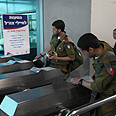Operations, deployments and secret units – soldiers who talk on the phone on their way to base occasionally reveal classified information. IDF to deploy undercover agents on trains in hopes of preventing leaks
Yossi Yehoshua
While the IDF is using advanced technological means to keep its secrets from leaking, it appears the most classified information can be easily accessed on Israel‘s railways.

Soldiers board train - Photo: Ido Erez
Commuters who regularly use the train are familiar with the phenomenon. IDF soldiers who talk among themselves or use their mobile phones occasionally reveal sensitive information such as military deployments, future operations or names of secret units.
This has led many citizens to complain of the uncontrolled chatter, prompting the IDF to launch a campaign to fight the phenomenon, Yedioth Ahronoth reported.
The wide-scale campaign aims to educates soldiers on what they can and cannot divulge on the train, as part of which undercover agents will be monitoring the flow of confidential information.
The agents, non-commissioned officers from the Information Security Department, will board trains in civilian clothing and try to prevent the leaks. They will locate soldiers who discuss sensitive information or use PCs containing classified material and educate them on information security guidelines. The agents may also take disciplinary action in serious cases.
Technological developments
According to a high-ranking source at the Information Security Department, hostile elements have enhanced their ability to collect classified information as a result of ongoing technological developments. This renders the challenge to keep secrets even greater. Enemy agents are known to wiretap cellular phones and collect information via the internet.

Potential for leaks - Photo: Moti Kimhi
Classified information can also leak through reservists who carry around operative plans and special training details on their PCs which lack army protection software. The reservists claim that the IDF does not provide them with computers unless they are high-ranking commanders.
The IDF has been monitoring social networks in the past few years, in search of photos and classified information uploaded to the web. Several soldiers who have been caught sharing secret information have been sentenced to extended terms in prison.
View original Ynet publication at: http://www.ynetnews.com/articles/0,7340,L-4241461,00.html







 Israeli New Shekel Exchange Rate
Israeli New Shekel Exchange Rate